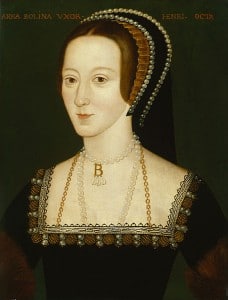 Recently I’ve been rather bemused by some of the comments I’ve seen on Facebook pages and groups regarding Anne Boleyn and those who are interested in her. When news got around that Amberley were publishing a biography on Anne Boleyn by Lacey Baldwin Smith people were complaining about it being “yet another book on Anne Boleyn” and commenting that there were far more interesting historical people to read and write about. Someone even went to the extent of starting a Facebook page “For Those Not Writing About Anne Boleyn” and posting:
Recently I’ve been rather bemused by some of the comments I’ve seen on Facebook pages and groups regarding Anne Boleyn and those who are interested in her. When news got around that Amberley were publishing a biography on Anne Boleyn by Lacey Baldwin Smith people were complaining about it being “yet another book on Anne Boleyn” and commenting that there were far more interesting historical people to read and write about. Someone even went to the extent of starting a Facebook page “For Those Not Writing About Anne Boleyn” and posting:
“Give it a few years, and there’ll be a super-highway, possibly another Spaghetti Junction, built on pulped Anne Boleyn novels. Another way for her fanpoodles to over-state her importance?”
I found it quite funny and am not at all offended by it (each to their own!), but I do think it’s all rather bizarre. I am fascinated by Anne Boleyn and I research and write about her on a daily basis. If that makes me an Anne Boleyn “fan poodle” then so be it, I’m in good company when the likes of the late Professor Eric Ives wrote of her being the third woman in his life after his wife and daughter. Surely people have the right to be interested in whoever or whatever they like and shouldn’t be made to feel shallow or bad about it. It would be a boring world if we were all interested in the same thing and I really don’t want my interests to be ‘policed’ by someone else. I don’t want to be labelled a “fan poodle” just because my interest is of no interest to someone else.
I write about Anne Boleyn and Tudor history because I want to write about what I’m passionate about. I’ve studied various periods of history, I’ve studied world religions and various other topics but I choose to write about Anne and the Tudors because they’re my passion. Every day, and I mean every day, I receive emails from people who are just as fascinated by Anne Boleyn and publishers like Amberley realise that there is this enduring fascination with Anne and they are simply feeding this demand. People are hungry for information on Anne, Henry VIII and his six wives, and that’s just the way it is. If you don’t like Anne Boleyn then the Anne Boleyn books and websites aren’t aimed at you and you can just ignore them. Nobody is forcing you to buy a book. I’m not into fly fishing but it doesn’t mean that I can’t respect those who discuss it on forums and buy every book and magazine that there is about the subject. Fly fishing is obviously their passion, it just doesn’t float my boat, as they say.
As far as over-stating Anne Boleyn’s importance is concerned, well, she didn’t save the world but she was an important person. As Eric Ives wrote, “Anne Boleyn was so much more important than the circumstances of her execution”, and his whole biography is about her importance and the impact she made. He explains:
“Under her encouragement, royal policy took directions which continue to shape the English constitution today. Anne was also an active and effective politician… Equally significant was Anne’s personal religious commitment. It laid the foundation blocks of Protestant England and set the scene for the monumental changes that produced the religious settlement of her daughter, Elizabeth I.”
And I completely agree. You only have to look at the names of the men Anne helped to promote in the Church to see how she shaped the Reformation in England. Edward Fox, Hugh Latimer, William Barlow, Nicholas Shaxton, Edward Crome, Thomas Garrett, William Betts and Matthew Parker (Elizabeth I’s future Archbishop of Canterbury) are just some of the men who gained ecclesiastical positions due to Anne’s help and patronage, and they were all reformers. Anne was a passionate evangelical and she took action on her faith and beliefs. William Latimer recorded that Anne told her chaplains “I have carefully chosen you to be the lanterns and light of my court” and that they should teach her household “above all things to embrace the wholesome doctrine and infallible knowledge of Christ’s gospel.” Historian Maria Dowling comments that “Anne showed concern throughout her career for the production and dissemination of the bible in English. In private, she encouraged her household servants to read and discuss the scriptures.” I don’t believe that she was the Protestant martyr John Foxe made her out to be and I don’t believe that she single-handedly started the English Reformation, but she played a role and that should be recognised.
Anne was important and influential in so many ways, for example in her patronage and promotion of Renaissance art, and we could write a whole book about it, as Ives has. Although I agree that we should be careful not overstate her importance, we should also not understate it. Ives concludes in his preface to “The Life and Death of Anne Boleyn” that Anne “was the most influential and important queen consort this country has ever had” and I, for one, agree with him. You might not, but then we can’t all agree, can we?
I’m looking forward to reading more books on Anne Boleyn, are you?
My name is Claire Ridgway and I like Anne Boleyn.